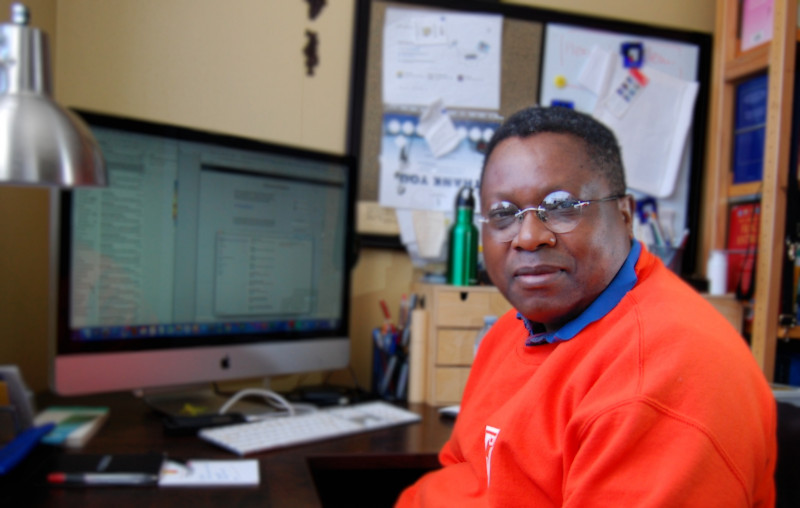Development of Rapid COVID-19 Detection System based on Surface Acoustic Wave Technology Platform
This press release was written by Research Nova Scotia.
 “Our goal is to develop a point-of-care rapid COVID-19 virus detection technology platform,” says Dr. Mkandawire. “It would be an inexpensive, portable, and easy-to-use device, which would eliminate the need for highly technical laboratory equipment or training.”
“Our goal is to develop a point-of-care rapid COVID-19 virus detection technology platform,” says Dr. Mkandawire. “It would be an inexpensive, portable, and easy-to-use device, which would eliminate the need for highly technical laboratory equipment or training.”
Dr. Martin Mkandawire is a Solid-State Chemist and Chemistry Professor in the School of Science and Technology at Cape Breton University. His team’s project aims to rapidly diagnose COVID-19 from a person’s oral and nasal fluids with the entire detection protocol being completed within 5 to 10 minutes.
According to Dr. Mkandawire, an emerging key to controlling the spread lies in quick and accurate diagnosis of infected patients. In addition to inadequate testing devices and facilities, most COVID-19 related deaths have been attributed to slow tests.
“Today, diagnosis of the COVID-19 involves collecting specimens from suspected patients, preparing the sample, amplifying the virus, and extracting its biomolecules prior to specialized analysis,” explains Dr. Mkandawire. “The detection procedures are slow and are limiting our public health responses.”
The existing testing methods are especially ineffective for screening patients living in remote areas as they are out of timely reach of specialized equipment. Current techniques used for most viral detection methods are hampered by the need for reagents, refrigeration, and specially trained laboratory personnel.
“It is highly likely that many cases of COVID-19 have gone or are going undetected,” says Dr. Mkandawire. “A more rapidly deployable test will facilitate more widely-available testing and provide immense opportunity for timely control and reduction of unnecessary deaths.”
Teams around the world are racing to develop a rapid testing method. A key to solving this critical problem is research into many different candidate approaches. Dr. Mkandawire has been developing a unique specialization which brings a fresh perspective to developing a rapid test.
The research team’s proposed technology platform will test for the virus using surface acoustic wave (SAW) biosensors. SAWs are sound waves that travel parallel to the surface of an elastic material. If successful, this approach would eliminate the need for reagents, sample processing, and specialized personnel. The SAWs biosensors can detect very low concentrations and can be manufactured from cheap and locally available material.
“The many challenges of COVID-19 are being met by researchers in Nova Scotia,” says Stefan Leslie,
CEO of Research Nova Scotia. “It was Dr. Mkandawire who recognized that his expertise at Cape Breton University may be an important key to managing this pandemic. Research Nova Scotia is proud to support him.”
If this work succeeds, the technology platform could alleviate negative economic impacts and help stop the spread of the virus through rapid diagnosis. It could take pressure off laboratories and reduce strain on the healthcare system as Nova Scotia prepares for future waves of the virus.
To further contribute to the Government of Canada and the Province of Nova Scotia’s efforts to address the COVID-19 outbreak, Research Nova Scotia (RNS) continues to provide rapid response funding from its Research Opportunities Fund. This fund was created by the Province of Nova Scotia to enable RNS to provide financial support to research projects that have the potential to benefit Nova Scotians.